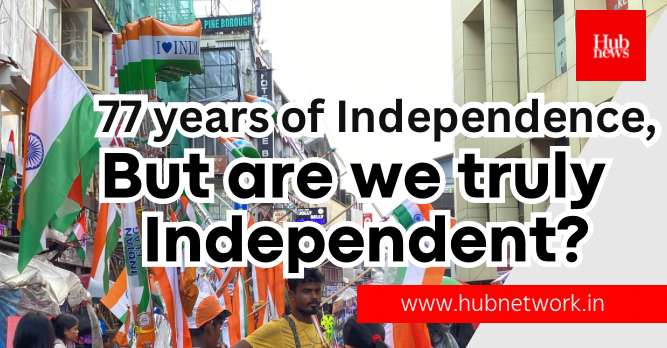– Kenny Jyrwa
As India is celebrating 77 years of Independence on August 15, 2023, the pressing query on everyone’s mind, myself included, pertains to whether we, as Indians, can genuinely lay claim to true Independence.
Without a doubt, we secured our freedom on August 15, 1947. However, the lingering question remains – do we truly enjoy independence in all its aspects? Despite attaining sovereignty, certain facets of our lives remain entangled in the legacy of English rule, even to this day.
In our society, particularly in Meghalaya, a distinct sense of pride is attached to showcasing flawless English proficiency – the language of the British rulers who governed us for nearly four centuries. It’s worth noting that those not fluent in English are often subject to social judgment, unfairly deemed intellectually inferior. Unfortunately, we’ve equated intelligence with English proficiency, often sidelining teaching of native languages. Parent-teacher meetings reveal a disproportionate focus on English fluency, overshadowing the value of our languages like Khasi, Pnar, Bhoi, War, Maram, or Garo.
Ironically, the invader’s language has been elevated to a point where proficiency in it holds more esteem than mastery of indigenous languages. The preference for English-medium schools over local-medium ones mirrors a societal mindset still influenced by the British era.
This perspective persists: English majors are often perceived as more intelligent than those majoring in languages like Khasi or Garo. The notion that English equals success perpetuates, creating the misconception that mastering English is a prerequisite for achievement. Despite India’s vast linguistic diversity, the primary focus continues to be mastering a single language: English.
Hence, our way of life lacks complete independence for several reasons: we’re drawn to Western lifestyles yet hesitant about our own, we embrace Western entertainment and music while neglecting our native forms, and we prioritize Western celebrities over local icons. Our fervor for English Premier League matches sometimes overshadows support for local teams.

So, the lingering question remains – are we genuinely independent?
If India is truly independent, why haven’t we nurtured our mother tongues? Why do we shy away from using them? Why have they become synonymous with backwardness? These are the pertinent questions.
Curiously, our mindset reveals its all – social media posts in English garner more attention than those in local languages. English captions exude sophistication, shedding light on our distorted thinking. Without a liberated mindset:
Can we genuinely claim independence?
India, a tapestry of diversity and myriad cultures, still rides the wave of English influence. We relish being addressed as “Sir or Ma’am,” yet feel less esteemed when spoken to in our native tongues as “Bah or Kong”. Even today, our Judiciary upholds the English way of addressing Judges as “My Lord” and “Your Honour,” and administrative practices continue to echo the British Raj, as observed in the usage of “Aye & No” during voice votes in the Assembly. To a significant extent, our administration, including our District Council, designed to safeguard our identity, conducts portion of its affairs in English – the very language of our former ruler.

Pause for a moment and contemplate – are we genuinely Independent?
Our History Books, the ones we learn from in schools, still present the English version of our history. India was colonized once, but it needs to undergo a second conquest – a conquest through education. The British tailored Indian history to suit their agenda. We were taught that Alexander’s invasion civilized us; chains and cushions were beneficial for the natives. The conquests of Mohammed Bin Qasim, the glories of Tulips, Lodis, Mughals – all deemed beneficial for India. Akbar was great. Shah Jahan was great. But what about Tirot Sing, Kiang Nangbah, and Pa Togan Sangma? Why do we know so little about our very own heroes who sacrificed for our freedom, yet learn extensively about foreign invaders? We’re well-versed in English monarchs and their family affairs, but do we know about Ka Ïng Sad at Smit and the creation of the world-famous Living Root Bridge? Why Shakespeare and not Soso Tham? The question arises – why do our school books remain so selective?

Learning isn’t wrong, knowledge is invaluable, and expanding our horizons is essential. But neglecting our own heritage is a mistake.
“Jong kiwei ngi itynnad, ka jong la jong lei kham palat”.
The essence of my argument is simple. India has accomplished much, and no one can deny that. Yet, many Indians must liberate themselves from this skewed mindset and take pride of our “Azadi”!


Also Read: Autumn Blooms in Meghalaya: State unveils spectacular festival roster this fall
Also Watch
Find latest news from every corner of Northeast India at hubnetwork.in, your online source for breaking news, video coverage.
Also, Follow us on-
Twitter-twitter.com/nemediahub
Youtube channel- www.youtube.com/@NortheastMediaHub2020
Instagram- www.instagram.com/nemediahub






